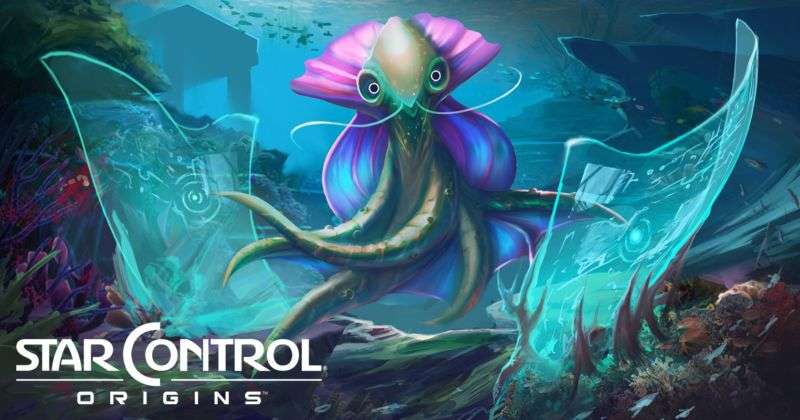
Original Star Control creators deploy nuclear option against Stardock

The ongoing legal battle between original Star Control creators Fred Ford and Paul Reiche III and Star Control: Origins developer Stardock escalated significantly on the last day of 2018. Following a favorable court decision, Ford and Reiche filed DMCA takedown requests with Steam and GOG over allegations that Star Control: Origins infringes on Ford and Reiche’s copyrights. Steam and GOG both removed Star Control: Origins from their respective stores, cutting off significant revenue sources for Stardock.
The move is the latest in a nearly year-long legal battle (which itself had been brewing for at least several more years before evolving into actual litigation) between Ford and Reiche and Stardock. At issue is the convoluted mess of copyrights and trademarks that make up the Star Control universe; the outcome of the case appears to hinge on a decades-old agreement between Ford and Reiche and defunct developer Accolade—and how that agreement’s dissolution affected ownership of the Star Control IP.
The shortest recap I can give
Recapping the course of the lawsuit—lawsuits, properly, since there are multiple suits proceeding apace—would take a considerable amount of time, but the short version is that several years ago, Stardock purchased the “Star Control” name and trademark and a bunch of rights related to Star Control 3, with the intent of making a new Star Control game that would eventually come to be known as Star Control: Origins. Stardock reached out to series creators Ford and Reiche multiple times over the years asking for their involvement and blessing, but Ford and Reiche appeared to be apathetic about the game’s development.
Things were pretty calm until Ford and Reiche announced that the time had come to make their own proper sequel to Star Control 2, finally addressing the game’s notorious quarter-century-old cliffhanger ending. In response to this announcement, the lawsuits began to fly—Stardock alleged that Ford and Reiche were improperly infringing on Stardock’s ownership of the Star Control trademark and attempting to piggyback on Stardock’s customer goodwill. Things got even uglier over the course of several court filings, with Stardock going so far as to allege that Ford and Reiche weren’t the actual creators of Star Control at all. (Indeed, Stardock CEO Brad Wardell’s statement on Steam about this week’s DMCA takedown initially referred to Ford and Reiche as “contractors on the classic DOS game, Star Control 2 for Accolade,” though the post has since been edited to read “the designers on the classic DOS game, Star Control 2 for Accolade”.)
No one disagrees that Stardock came by the “Star Control” name and trademark properly—in fact, that’s pretty much the only thing everyone agrees on. At the core of the disagreement is whether or not Ford and Reiche properly own what they say they own—the collected copyrights and intellectual property that make up the first two Star Control games, along with the rights to sell those games. Stardock claims that Ford and Reiche don’t own those things, and Ford and Reiche claim they do. Who’s right depends on some very murky issues—our detailed breakdown from early 2018 explains things about as well as they can be explained.
The suit(s) proceeded throughout 2018, with both sides advancing and rejecting settlement offers while growing more and more acrimonious. Both sides collected a long list of filings, many related to documentation—so, so much documentation (interested parties can sift through the mountain of paperwork over at Court Listener, if you have the fortitude). Stardock appears to have adopted a “throw everything against the wall and see what sticks” strategy of litigation, potentially with the goal of stretching the court battles out over an extended period and winning (at least in part) by attrition. Ford and Reiche, facing what could be years of lawsuits, hunkered down and set up a legal defense fund. Both sides have said they are prepared to push for jury trials.
There has been a tremendous amount of he-said-she-said, but no substantive developments—until last week.
Dread Judge
Back in September, Stardock filed a motion for a temporary restraining order against Ford and Reiche, asking that a preliminary injunction be granted against Ford and Reiche filing DMCA takedown requests against Star Control: Origins. This appeared to be a preemptive defense against Ford and Reiche yanking Stardock’s game off of store shelves, which could in turn have substantive impact on Stardock’s 4Q18 and 1Q19 revenue.
The response to that motion came back on December 27 in the form of a stinging rebuke from District Judge Saundra Brown Armstrong. The twenty-page order shows a judge who appears to be losing patience with both sides’ incessant legal maneuvering, noting that both parties appear committed to burying the court in paperwork and striking many of both parties’ filings due to their length.
But while Judge Armstrong had strong words for all participants, she reserved the bulk of her ire for Stardock. Although the motion ostensibly focuses only on the matter at hand—the granting or denying of a preliminary injunction against Ford and Reiche filing DMCA requests—Armstrong peppered the decision with a number of overt jabs at Stardock, hinting that she likely believes many of Stardock’s foundational legal arguments are somewhat or totally specious. One particularly pointed footnote reads:
Many of the parties’ objections are frivolous. For example, Plaintiff objects to Reiche’s declaration, “I created the concept for the Star Control computer game,” on the ground that it lacks foundation. Dkt. 66-12 at 2. Clearly Reiche has personal knowledge as to what he did or did not create. See Fed. R. Evid. 602 (a witness’s own testimony may support a finding that he has personal knowledge of the matter to which he testifies). On the other hand, the merit of other objections is obvious. For example, Defendants object to Wardell’s declaration, “Stardock has not incorporated any copyrightable artwork from Star Control I, Star Control II, or Star Control III into the Origins game itself,” on the ground that Wardell lacks the expertise necessary to opine as to what constitutes “copyrightable artwork.” Dkt. 64-26 at 2-3. Indeed, not only has Wardell failed to establish any such expertise, but his opinion as to whether the work in question is “copyrightable” constitutes an improper legal conclusion. See United State v. Diaz, 876 F.3d 1194, 1197 (9th Cir. 2017) (citing Fed. R. Evid. 704). Such legal conclusions are without evidentiary value.
Stardock’s reason for requesting the injunction in the first place—that the company needs the revenue from the game’s sale to continue functioning—is brushed aside with what from a Senior District Judge sounds almost like annoyance. Armstrong essentially says that if Stardock anticipated this ongoing legal issue might impact Origins’ sales, then Stardock should have waited for the lawsuits to be won or settled before releasing the game:
In view of the foregoing, the harm Plaintiff complains of is indeed of its own making. Plaintiff had knowledge of Defendants’ copyright claims from the outset. Despite that knowledge, it developed potentially infringing material without resolution of the IP ownership issues, and then publicized the release of that material during the pendency of this action. It now claims that its investment in Origins and reputation are on the line. Given that Plaintiff largely created the foregoing predicament, the Court is disinclined to extricate Plaintiff from a peril of its own making. See GEO Grp., Inc. v. United States, 100 Fed. Cl. 223, 229 (2011) (“[T]he court is ill-inclined, at this late hour, to pull [the plaintiff’s] chestnuts out of a fire sparked by its own ill-fated tactical decision.”).
Takedown deployed, game yanked
With the motion for injunction disposed of, Ford and Reiche wasted no time doing exactly what Stardock feared they would do: firing off DMCA takedown notices to GOG and Steam to remove Origins from sale, on the basis that Origins contains material that infringes upon Ford and Reiche’s copyrights. This happened on Monday, and by Tuesday evening, Origins had been pulled from both the GOG and Steam storefronts. (The takedown has no effect on customers who have already purchased Origins—the game will remain playable in players’ libraries without any issue.)
At this point, things appear to be at a stalemate. Stardock may choose to follow the infringement counterclaim process, which is the legal remedy provided under the DMCA whereby parties targeted by a takedown can have access restored to their works by providing evidence under penalty of perjury that they do indeed own the rights under contention and that the takedown was invalid or otherwise improper. Ars reached out to Stardock’s Wardell, who linked to Stardock’s official statement, then continued:
As anyone who has actually played Star Control: Origins can tell you and as you already know from previous discussions, Star Control: Origins has nothing to do with Reiche and Ford’s work. It’s a new universe with its own characters and lore.
We have repeatedly reached out to Reiche and Ford to ask what, specifically, they think they have a right to within our game. They’ve never responded beyond claiming to own concepts like resource gathering and space exploration.
Wardell further told Ars that Stardock “genuinely have no idea on what grounds they [Ford & Reiche] think they are DMCAing our game,” and that Stardock has begun laying off staffers in response to the takedown due to a lack of work. Wardell did not comment on whether or not Stardock will pursue a DMCA counterclaim. Ars has also reached out to Ford and Reiche, who have not yet issued a formal statement as of press time, and to representatives from Steam and GOG, who also have not yet responded. We’ll update this report if any of the parties gets back to us.





